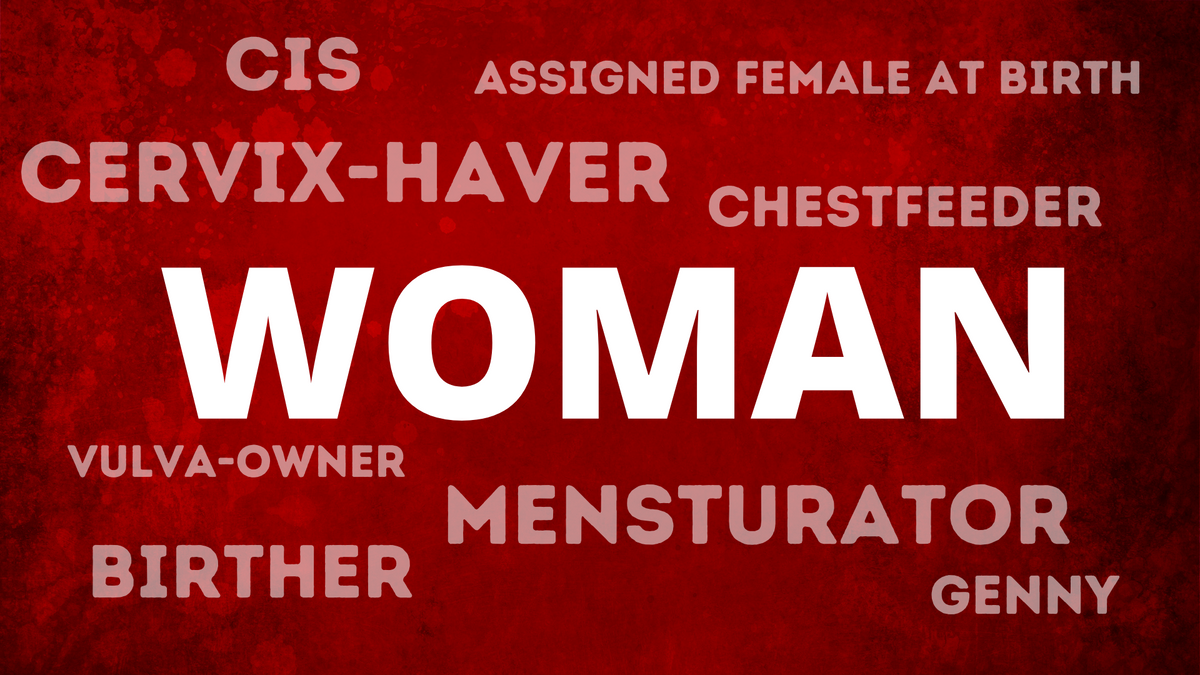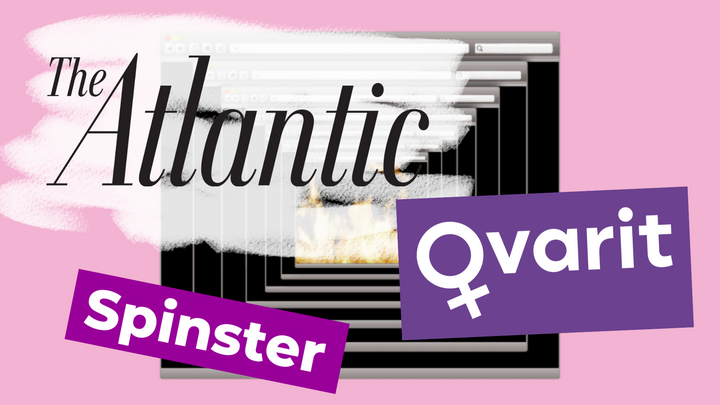Women’s Organizations are Removing the Word "Women" From Their Vocabulary
They claim the word is "not inclusive"

First, they came for the word "woman." As early as the 1970s, male transsexuals have had a name for women: “Gennys” – Genetic Women. It is recorded on a letter by transsexual Angela Douglas, from Berkeley in 1977. "Gennys have never had to suffer... discrimination, self-hatred, or fear," the letter claimed. "Genetic women are not ridiculed as severely, killed, tortured, and arrested... Genetic women are becoming quite obsolete, which is obvious, and the future belongs to transsexual women." The intent of the transsexual agenda to erase women has never been a secret. It has, however, become more mainstream.
This year, Harry Potter author J. K. Rowling has been attacked relentlessly for opposing the usage of the term “people who menstruate.” Before that, several groups, from institutions to charities and the media had been using words describing female body functions instead of using women or female.
When women protested vigorously on social media (and especially since women’s campaigner Kellie-Jay Keen, also known as Posie Parker, created a meme out of the dictionary definition of women in 2018), they came for the word female too.
However, at the end of October 2020, a concerted attack on womanhood was orchestrated on Twitter. Several organizations that were supposed to champion awareness of female conditions such as endometriosis, PCOs, pregnancy, and birth posted tweets and threads with dehumanizing language, reducing women and girls to their body parts, unnamed.
Rewire News Group, who states in their Twiter bio, “Own your relationship to sex, abortion, parenthood, and power,” tweeted that it’s a “fact” that “roughly 1 in 10 people who are born with a uterus will be diagnosed with endometriosis in their lifetime, though experts estimate the actual prevalence of the disease is much higher.” In another tweet on October 23, they stated: “Endometriosis is a chronic reproductive condition that affects roughly 1 in 10 people assigned female at birth—and the situation for patients is dire.”
Tampax called women “menstruators,” stating that, “not all women have periods. Also a fact: not all people with periods are women. Let's celebrate the diversity of all people who bleed.” Both groups started their tweets with the word “fact.” Group U By Kotex also called women menstruators when talking about research on fibroids.
Hello FemCare family.
— FemCare Community Health Initiative (@FemCare_CHI) October 24, 2020
Did you know that menstruators with PCOS have higher rates of anxiety and depression than women without the syndrome?
(Source: https://t.co/EW1EFab8Aq).#freetheflow #LetstalkPCOS #letstalkperiods #FemCaretopicofthemonth pic.twitter.com/sCtCj2noZf
CNN ran an awareness campaign calling women “individuals with a cervix,” who are now “recommended to start cervical cancers screening at 25 and continue through age 65.”
Group La Leche League USA supports “all breastfeeding, chestfeeding, & human milk feeding families, inclusive of race, ethnicity, immigration status, national origin, creed, age, sexual orientation, gender identity, family structure, primary language, ability, or socio-economic status.” They followed up by blocking users on Twitter who criticized their wording by commenting or sharing their tweet..
FemCare Community Health Initiative, “Canada's trusted leader in menstrual policy consulting, education, entrepreneurship and research,” according to their bio on Twitter, also called women menstruators in several tweets. The first on their timeline says: “Hello FemCare family, did you know that back in the 1800s, menstruators wouldn’t get their periods until they were well into their teens. Nowadays, the average age to start menstruating is 12 years old. At which age did you start your period journey?”
But perhaps the most heartbreaking stance over the weekend has come from a charity who supposedly helps women with baby loss. Sands UK tweeted about how often the focus of support and comfort is on “the birthing parent, which can leave partners or non-birthing parents feeling isolated and alone.” Hundreds of women commented about how distressed they were about being dehumanized in this way. So far, Sands is the only group who has apologized for excluding the word woman, saying they should have “included it” in the first place.
Often the focus of support and comfort is on the birthing parent, which can leave partners or non-birthing parents feeling isolated and alone.
— Sands (@SandsUK) October 10, 2020
Sands is here for you 💙🧡
👉 https://t.co/SWgqnUbYtH#BLAW2020 #YouAreNotAlone#SandsHereToSupport #BabyLoss pic.twitter.com/fj8gZSvtA8
But the protagonist of every birth is a female who got pregnant. Institutions are being brainwashed that words like “female,” “woman,” and “mother” are not inclusive of all humans who have the potential ability to bear children. To include the word mother becomes an afterthought, but it should never have been excluded in the first place. Treating mothers as second-class citizens is no different from the rest of the patriarchy, where women are second class citizens—or not even citizens at all.
Meanwhile, males who claim they identify with the opposite sex are reclaiming these words for themselves. A man who identifies as a woman was recently spotted on a breastfeeding Facebook group describing how he was simulating a pregnancy with an electric device to be able to get contractions and using drugs to lactate, according to comedian Graham Linehan.
Does this mean that males who claim they are women are entitled to be called women, females and mothers, but women are not? Scott Newsagent, a female who took steps to achieve a male appearance, stated that she is a mother who gave birth to twins and opposes female erasure.
Women gave birth to all humans. The UK seems to agree with this in law. When Freddy McConnell, a female born who gave birth after transition, appealed to be called father on the birth certificate, the Court of Appeal “upheld the term "mother" is inclusive of all who grow another human being inside their body even if they identify as men (or non binary),” wrote Maya Forstater. According to Anya Palmer, “140 million women give birth every year. A handful of them identify as men and have undergone physical changes to look like men externally, while keeping the ability to give birth.”
Individuals with a cervix are now recommended to start cervical cancers screening at 25 and continue through age 65, with HPV testing every five years as the preferred method of testing, according to a new guideline released by the American Cancer Society https://t.co/gUhYdIIx69
— CNN (@CNN) July 30, 2020
The ability to give birth is female. The female body is already neglected at every turn, as Caroline Criado-Perez research, which became the book “Invisible Women,” proves well. This stance is harmful to women even in English speaking countries. Calling women “individuals with a cervix,” especially in the context of providing health information, will harm women, half of which don’t know what a cervix is. The very language undercuts the goal of women’s health awareness campaigns.
It gets even worse with other languages. For Portuguese and Spanish speakers, there isn’t a word for “parent” as in English or French. A parent in Portuguese or in Spanish is a “father” (pai, padre). There is the word “genitor” in Portuguese which is never used when talking to parents in a medical context, only in law where the parents of a child are referred simply as their biological parents, in cases of parenthood disputes, for instance. By refusing to use the word mother in these languages, organizations are actually using the word “father” instead. The erasure of women’s role in birthing and raising children is complete.
Inclusivity in female issues should never come at the cost of excluding women from their own material reality. It should be addressing period poverty, access to medical services such as cervical screening, faster endometriosis diagnosis, menopause awareness, seeking the end of obstetric violence. Women do exist as a separate sex-class from men, and it is their ability to potentially gestate what is exploited in patriachal systems, not their femininity performance.
Do you want to bring the "gender madness" to an end? Help us write about it! 4W is able to pay our all-female staff and writers thanks to the generous support of our paid monthly subscribers.
Enter your email below to sign in or become a 4W member and join the conversation.
(Already did this? Try refreshing the page!)




Comments